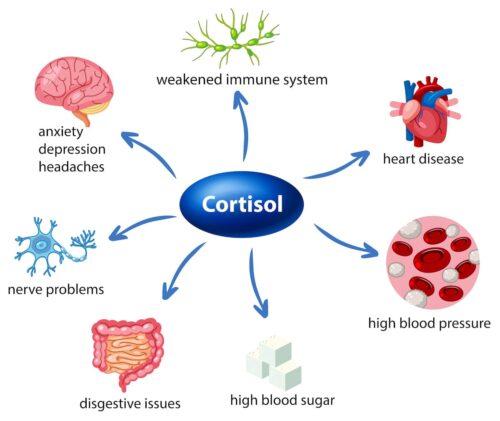Stress Awareness Month is celebrated in April but it doesn’t have to be April to identify diverse ways to cope with stress. Stress is a very important topic since it’s a condition of strain that everyone experiences from time to time. Stress not only affects you emotionally and psychologically, but it also has a direct impact on your physical health. This is why is extremely important to learn how to cope with stress.
Stress is subjective. What stresses one person doesn’t necessarily affect someone else. Perception plays a big role in stress. You react to a stressor according to how you perceive it. If you perceive an event as the worst thing that ever happened to you, you’ll experience it in that manner and will react more negatively towards it. Read on to learn more about the effects of stress and concrete tips to cope with stress in a healthy way.
Effects of Stress
Stress affects your physiology in different ways according to the type of stress that you experience. Acute stress results from specific events or unpredictable situations. This is when you feel some kind of threat and your body releases hormones to help you confront those circumstances. Cortisol, the primary stress hormone, contributes to many physiological changes in your body and helps set in motion the fight-or-flight response.
During fight or flight, your heart beats faster than normal, pushing blood to your extremities, heart, and vital organs. Your pulse rate and blood pressure go up, your breathing accelerates, your airways open wide, blood glucose is released into the bloodstream to energize you, your senses (sight, hearing, etc.) sharpen, and nonessential functions for this response get suppressed (immunity, digestion, reproduction, etc.).
The hormone epinephrine (adrenaline) is, also, involved in the stress response to help pump you up. Experiencing acute stress consistently can lead to PTSD (post-traumatic stress disorder). Examples of acute stress are being in combat, almost getting into a car accident, learning that a loved one is in the hospital, or finding yourself in a dark alley with two suspicious individuals behind you.
On the other hand, chronic stress has tremendously negative effects and results from repeated exposure to situations where your stress response system is constantly activated. This recurrent activation of stress hormones contributes to the breakdown of bodily systems. Under prolonged stress, immune cells become insensitive to cortisol’s regulatory effect causing chronic inflammation and an array of dysfunctions.
Chronic stress has numerous negative effects and can wreak havoc on your body and mind. Chronic stress lowers your immune function and increases the risk of conditions like heart disease, high blood pressure, diabetes, depression, anxiety, gastrointestinal problems, obesity, Alzheimer’s, asthma, sexual dysfunction, and sleep disorders among others. Examples of chronic stress are being in an abusive relationship, experiencing financial hardship, having a demanding job, or feeling under constant pressure about a particular issue.

How to Cope with Stress in Healthy Ways
The American Psychological Association cites money, work, relationships, and the future of our nation as major stressors (agents that cause stress). Stressors, however, are not the main issue in relation to stress. Stressors and stress become a problem when left unattended or are managed improperly. Many people use drugs and alcohol, misdirect anger, overeat, go on shopping sprees, gamble compulsively, or use gaming as a way to relieve stress.
Escapism through unhealthy coping mechanisms only relieves tension and discomfort temporarily but, at the same time, creates vicious cycles of negative emotions and behaviors. Taking this into consideration, it’s imperative to learn how to cope with stress in healthy ways.
Stress is part of life and expecting to always live a stress-free life is unrealistic. When experiencing stress, a better approach is to take a moment to breathe and center yourself, acknowledge your feelings, adjust your perception and thinking, and implement strategies to cope with stress in a healthy way.
The following are some tips to help you stay calm and manage stress in healthy ways.
- Identify Your Stressors: Pinpoint the exact factor, person, or situation that’s stressing you.
- Adjust Your Mindset: Challenge cognitive distortions (unhelpful thinking patterns) and address situations objectively and rationally in other to avoid negative emotions and behaviors.
- Evaluate Your Level of Control: Assess if there is anything that you can do about the situation that’s stressing you. If so, brainstorm, start problem-solving, devise a plan, and create a shift. If you have no control over the stressor, accept that, let it go, and find an outlet for your stress.
- Practice Self-Awareness: Understand and acknowledge your emotions. Self-awareness is the first step in emotional regulation. Journaling can be a useful tool to track your emotions and identify patterns.
- Communicate: If there is a person who is the source of your stress, set healthy boundaries and have an open conversation to identify issues, clarify expectations, and solve problems.
- Foster a Healthy Body: Sleeping enough, having an organic, nutrient-dense, anti-inflammatory diet, and taking supplements help to keep your immune system working properly, and more apt to deal with stressors.
- Stay Active: Exercise (engage in cardiovascular and strength training) most days out of the week. Research shows that working out improves the way your body handles stress by affecting hormonal responses and neurotransmitters (dopamine and serotonin) that influence mood and behavior. Exercise, also, serves as a break from stressors and provides a calming effect.

- Stress Management: Manage stress through practices and stress-reducing activities that help you unwind, recharge, and stay present such as deep breathing, progressive muscle relaxation, yoga, mindfulness, meditation, hobbies, and spending time in nature.
- Find Pleasurable Outlets: Engage in activities that you enjoy and improve your emotional state. Spend time with loved ones, get a massage, listen to music or podcasts, dance, paint, play games, read, or write, and go to concerts, the theater, or the movies. Even though many people find drinking, using drugs, eating, shopping, gambling, and gaming pleasurable, it’s best not to engage in these activities when feeling stressed out. Since they are highly pleasurable, people can end up engaging in addictive patterns in the long term.
- Social Connections: Maintain and nurture positive relationships with friends and family. Social support is a crucial factor in emotional well-being. If needed, join a support group, use untapped resources, and/or find a therapist.
By applying the tips described above, you can cope with stress holistically (your thoughts, emotions, body, and interactions), you feel more at peace, are more productive, prevent physical ailments and premature aging, foster healthier relationships, and allow your body to thrive.
To a Healthier Fitter You,
The Fitness Wellness Mentor



